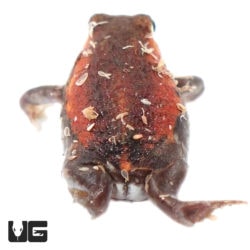Rain Frog for Sale: Elevate Your Collection with Uncommon and Exotic Amphibians!
Common Health Issues in Reptiles: Symptoms and Solutions
In the detailed globe of reptile treatment, comprehending the common wellness issues that might affect these special creatures is vital in guaranteeing their wellness. Whether it's grappling with parasitic invasions, browsing dehydration worries, or dealing with skin disorders that materialize in refined ways, being attuned to the signs and symptoms and equipped with the understanding of effective options is vital for any reptile owner.
Breathing Infections
Respiratory system infections in reptiles can dramatically affect their overall health and require punctual attention from knowledgeable veterinarians. In reptiles, respiratory infections can be especially testing to identify and treat due to their distinct anatomy and physiology.
Therapy for respiratory system infections in reptiles commonly includes a mix of helpful treatment, such as maintaining correct moisture levels and temperature level slopes in the unit, in addition to targeted medication to deal with the particular pathogen in charge of the infection. It is vital for reptile proprietors to check their animals closely for any type of signs of respiratory system distress and seek veterinary treatment at the earliest indication of a concern. With timely intervention and proper treatment, lots of reptiles can recuperate fully from breathing infections and resume normal tasks.

Metabolic Bone Disease
What factors add to the advancement of Metabolic Bone Illness in reptiles?
Metabolic Bone Condition (MBD) in reptiles is mainly created by an absence of correct calcium, phosphorus, and vitamin D3 degrees in their diet. Additionally, inadequate exposure to UVB light stops reptiles from manufacturing vitamin D3, which is vital for calcium absorption and bone health and wellness.
Inadequate humidity degrees can also affect a reptile's ability to metabolize calcium properly. Routine vet exams, proper husbandry techniques, and a balanced diet plan are vital to prevent Metabolic Bone Condition in reptiles.
Parasitical Infestations
Parasitic problems present a significant wellness risk to reptiles, influencing their total well-being and needing prompt vet attention. Reptiles can be impacted by numerous parasites, consisting of mites, ticks, interior worms, and protozoa. These parasites can create a range of signs and symptoms, such as fat burning, lethargy, skin irritability, diarrhea, and even death if left unattended.
One common bloodsucker found in reptiles is the mite, which can create skin anemia, tension, and inflammation. Ticks are another outside bloodsucker that can send diseases and cause pain to the reptile. Interior parasites like worms and protozoa can bring about digestive system issues, poor nutrition, and deteriorate the reptile's body immune system.
To detect a parasitic infestation, a veterinarian may do fecal examinations, skin scrapings, or blood tests. Therapy frequently includes deworming medicines, antiparasitic bathrooms, or in severe cases, a hospital stay. Preventative actions such as routine vet examinations, proper hygiene, and quarantine procedures for new reptiles can help minimize the risk of parasitic problems and guarantee the well-being of reptile family pets.
Dehydration and Hydration Issues
Dehydration in reptiles can significantly impact their health and wellness and wellness, necessitating prompt treatment and appropriate hydration monitoring. Reptiles are susceptible to dehydration because of various variables such as poor water intake, high environmental temperatures, and certain wellness problems. Symptoms of dehydration in reptiles consist of sunken eyes, sleepiness, loss of skin elasticity, and lowered peeing. If left without treatment, dehydration can cause major health issues and even be fatal to the reptile.
To stop dehydration, reptile proprietors need to guarantee that their pet dogs have access to clean water at all times. The water meal need to be large sufficient for the reptile to saturate in if required, particularly for types that take in water through their skin. Furthermore, keeping correct humidity levels in the reptile's enclosure and giving regular baths right here can aid protect against dehydration.
In situations of dehydration, it is essential to look for vet care without delay. A veterinarian may administer liquids either by mouth or via injections to rehydrate the reptile. It is vital next to address the underlying root cause of dehydration to stop reoccurrence and ensure the reptile's general wellness.
Skin Disorders

Final Thought

Respiratory system infections in reptiles can significantly affect their overall health and call for timely focus from knowledgeable vets (rain frog for sale). Preventative actions such as routine vet examinations, proper health, and quarantine procedures for brand-new reptiles can help decrease the threat of parasitic problems and guarantee the health of reptile family pets
If left without treatment, dehydration can lead to serious health and wellness concerns and also be deadly to the reptile.
Routinely evaluating your reptile for any changes in skin color, appearance, or structure can assist in very early discovery and therapy of skin ailments, promoting the general health and wellness and well-being of your scaly buddy. - rain frog for sale
In verdict, reptiles are prone to numerous wellness issues such as breathing infections, metabolic bone condition, parasitic invasions, dehydration, and skin conditions.